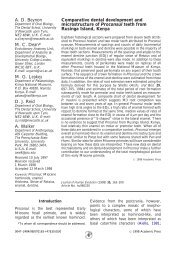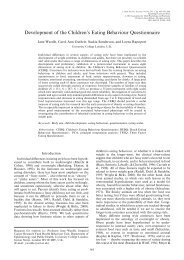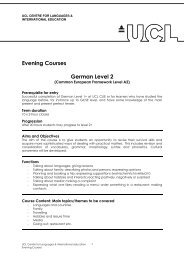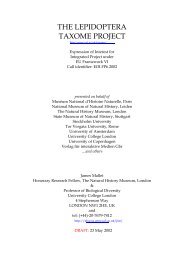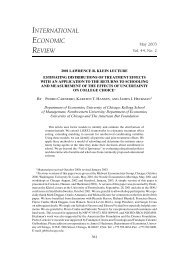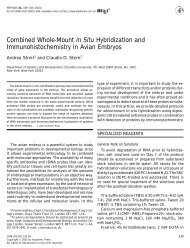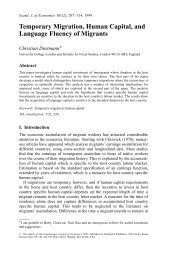The Ambitions of Contract as Promise Thirty Years On ... - UCL
The Ambitions of Contract as Promise Thirty Years On ... - UCL
The Ambitions of Contract as Promise Thirty Years On ... - UCL
You also want an ePaper? Increase the reach of your titles
YUMPU automatically turns print PDFs into web optimized ePapers that Google loves.
<strong>Ambitions</strong> <strong>of</strong> <strong>Contract</strong> As <strong>Promise</strong> 24 August 2012 discussion draft: do not quote or reproduce without permission<br />
Metaphysical Elements <strong>of</strong> Justice. 21 That the two should arrive at similar<br />
conclusions on many <strong>of</strong> the main points <strong>of</strong> contract doctrine 22 is striking.<br />
Differences come to the fore when the issue is the effect <strong>of</strong> social arrangements<br />
on the overall welfare <strong>of</strong> groups, 23 <strong>as</strong> opposed to the joint welfare <strong>of</strong> two<br />
contracting parties. <strong>The</strong> convergence is particularly salient in the design <strong>of</strong><br />
institutions that facilitate the coordination, through agreements, <strong>of</strong> the energies<br />
<strong>of</strong> otherwise independent persons. Legal regimes by their nature are concerned<br />
with institutional design, and both the Kantian and utilitarian perspectives focus<br />
on maximizing the preferences <strong>of</strong> individuals ex ante; that is, the two<br />
perspectives focus on the design <strong>of</strong> legal regimes and doctrines that<br />
collaborating individuals would themselves see <strong>as</strong> furthering the purposes they<br />
hope to achieve in their free collaboration. <strong>The</strong>re may be regret ex post, but the<br />
Kantian perspective makes the individual responsible for his own regret; the<br />
21 IMMANUEL KANT, THE METAPHYSICAL ELEMENTS OF JUSTICE (John Ladd trans., <strong>The</strong> Bobbs-<br />
Merrill Co., 2d ed. 1999) (1797).<br />
22 <strong>The</strong> strongest and most comprehensive statement <strong>of</strong> this convergence, from which I have drawn wisdom<br />
andencouragement, is Jody S. Kraus, <strong>The</strong> Correspondence <strong>of</strong> <strong>Contract</strong> and <strong>Promise</strong>, 109 COLUM. L. REV. 1603,<br />
1633–34 (2009) [hereinafter Kraus, Correspondence]. See also Jody S. Kraus, Philosophy <strong>of</strong> <strong>Contract</strong> Law, in<br />
THE OXFORD HANDBOOK OF JURISPRUDENCE AND PHILOSOPHY OF LAW 687 (Jules Coleman & Scott<br />
Shapiro eds., 2002).<br />
Tort law is another matter. I had made a less comprehensive attempt at addressing the moral foundations<br />
<strong>of</strong> tort law in Right and Wrong (1978) and An Anatomy <strong>of</strong> Values (1970). In Making Tort Law: What Should Be<br />
Done and Who Should Do It (2003) (with David Rosenberg), our analysis and conclusions over a large range <strong>of</strong><br />
topics coincided with those <strong>of</strong> the economic analysis <strong>of</strong> the subject.<br />
23 See RAWLS, supra note 15, §§ 5-6.<br />
12




